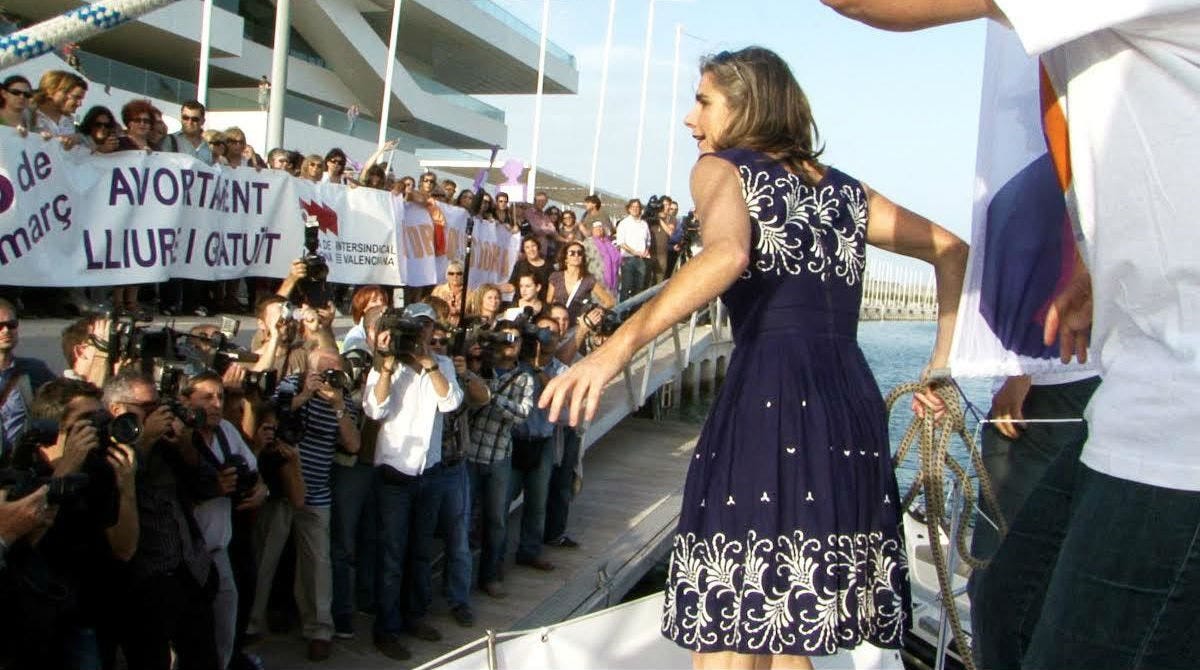About 10 years ago, I stood on the streets of Quito, Ecuador, interviewing strangers about a taboo topic. I was an associate producer shooting a film about Rebecca Gomperts, a doctor who made it her life mission to give women access to abortion, no matter what the law said. She’d taken boats to countries like Portugal, Poland, and Spain where abortion is illegal, and offered abortion off-shore. A master of PR, her visits were meant to demonstrate how far women had to go to get a safe abortion. At one point, Portugal sent war ships to block her arrival on shore -- an act of war.
Like Portugal, Ecuador is a heavily Catholic country, where abortion is illegal. We asked people on the main thoroughfare in Quito what they thought of abortion, and most people agreed that it should be illegal. But when we asked, “Do you know anyone who’s had an abortion?” the answers took a different turn. “Yes, but that case was different,” many of our interviewees would say. There was a health issue, or she was in college, or there’s no way her family could support another child--countless exceptions to the law of the land that made it ok inn their case, the case of a person they know and love.
So when there are so many exceptions to anti-abortion laws, what is it that anti-abortion believers are fighting for?

The meaning of life
The fundamental question for anti-abortion advocates has nothing to do with the person who is pregnant and everything to do with understanding when ‘life’ actually begins. The Supreme Court shied away from defining it in Roe versus Wade and in the Dodd ruling, but this question is at the core of the anti-abortion movement.
Does life start at conception? The sanctity of life at conception stems from Christianity, especially Catholics and Evangelicals; however, in Judaism life is said to begin at first breath, and in Islam the soul enters the body at 4 months. Does it start at the first heartbeat? This is the basis of the 6-week ”heartbeat bills” that ban abortion after the impossibly short 6 weeks (shortened further as it’s counted from the last period, not from conception).
The most extreme anti-abortion advocates believe in “fetal personhood,” the idea that the cells rapidly multiplying from the moment of conception has the same rights to life as a child, or a teen, or an adult.
This nebulous set of rights doesn’t just have implications for abortion. A pregnant woman recently sued the Texas state government because she received a ticket for driving in the HOV lane. Does her baby bump not count as another passenger, allowing her to claim she was not driving solo? If life begins at a heartbeat, or at conception, would a fetus get life insurance? Be a dependent? But building an argument based on this hypocrisy could be a terrible rabbit hole. Great, pregnant people can get to where they’re going faster, but they are still on the hook for bearing a child, even if it’s not wanted, or endangering their lives. Georgia is already offering a tax credit for fetuses with a heartbeat, a law that the ACLU is fighting as it helps establish fetal personhood.
It also extends to other questions about life. Under the fetal personhood model, the morning after pill could constitute murder, and birth control itself is endangered, as it’s ‘pre-meditating’ the end of a potential life.
The other oft-repeated argument about the idea of life before birth is how little effort anti-abortion advocates within the Republican party focus on life after birth. Gun control, health care, parental leave, and other issues can create better, longer lives for children out of the womb, and these are the issues that many anti-abortion Republicans either do not support or actively fight.
Thinking back to Ecuador, the very notion of abortion was abhorrent to many of the people we interviewed, because the idea of fetal personhood put the fetus on the same plane as a fully grown person. Until it came to their friend, sister, or cousin who had had an abortion. Then the flesh and blood woman they know, whom they’ve hugged or laughed with or cheersed over a meal, became the more important life.
And this is the rub. When a distant court can decide whose life is more important, more real, more deserving of breath and choice and agency in the zero-sum game that fetal personhood advocates have created. The idea of a life? Or a living human being?
A few links
House of the Dragon made this very choice deadly clear in an unforgettable scene juxtaposing a childbirth and a brutal game of joust. Vox breaks it down in light of a post-Roe America.
If you want to learn more about Rebecca Gomperts and her wild life creating abortion access, watch Vessel here.
—-
You’ve just read Framing, a regular newsletter about what’s good in culture, marketing, and business by Anita Schillhorn van Veen. I’m Director of Strategy at McKinney, on the lead team of Ladies Who Strategize, and a writer over at my other favorite Substack Why Is This Interesting.
I write this newsletter and distribute it freely because I enjoy writing and thinking through problems—if you appreciated this, donate to the National Network of Abortion Funds or subscribe below.




